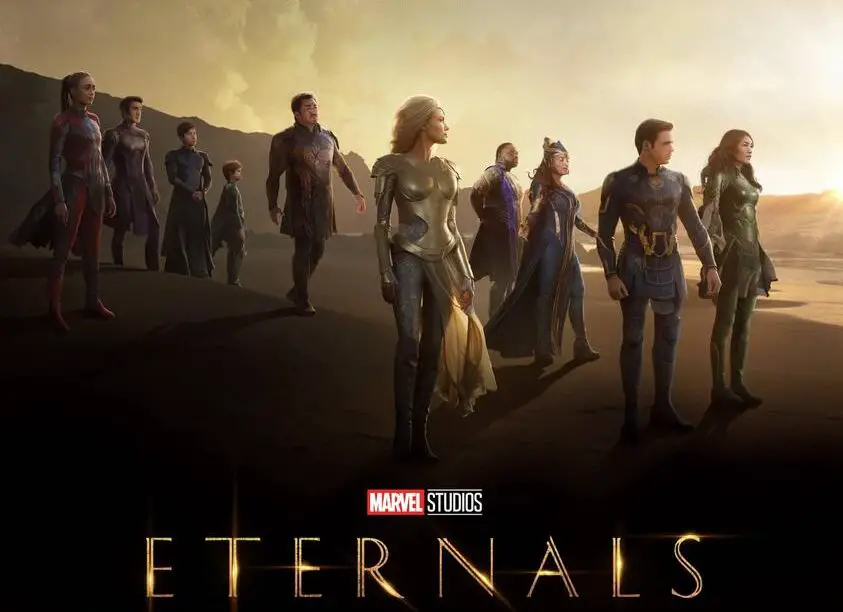This Eternals review contains mild spoilers.
In a superhero movie centered around powered immortal beings, humanity is an essential aspect of the narrative. But, given they spend 7,000-plus years amongst humans, perhaps this is an inevitable outcome.
Marvel Studios‘ Eternals introduces Earth’s earliest superheroes to its cinematic universe: Ajak, Sersi, Druig, Gilgamesh, Ikaris, Kingo, Phastos, Makkari, Sprite, and Thena. These 10 Eternals are tasked by Arishem the Judge, a Celestial, with saving the Earth from the Deviants, staying there for thousands for years to complete their mission. But, even after defeating the Deviants, the Eternals stay put on Earth. They live amongst humans till they’re told they can return home to Olympia.
In addition to protecting and saving humans, the Eternals guide the evolution of the human race and its society. With this and their powers, however, comes the question of how much help do they provide?

Arriving in 5000 B.C. at Mesopotamia, the Eternals are powerful enough to have helped the human race advance far more quickly than it had. But this is just one instance where they have to decide where to draw the line between being guides to humans versus dictating the development of the human race. And it’s that general idea of how to use their powers and abilities that generates conflict amongst the group.
For the technopath Phastos (Brian Tyree Henry), it’s the question of how advanced should technology be for humans at different points in time? For Druig (Barry Keoghan), it’s the question of should his mind control power be used to end violence and eliminate the conflict between humans?
There’s understandably a lot of exposition — 5,000 years is a lot to cover. So a good portion of time is spent bouncing back and forth between the present-day Marvel Cinematic Universe and different points of the past. With each flashback, the audience gets a better sense of how the Eternals helped humans get to their present-day society in addition to what led to the group’s separation. This method of storytelling allows for suspense to linger longer and provide further reveals as the Eternals rejoin forces. But it can feel like a lot, especially with the various settings.
At the start of the film, there’s a sense that the Eternals are simply these mindless powered beings with a purpose to accomplish. But it doesn’t take long for that to change. The characters can all stand on their own, but they’re better together. The film takes time to establish who they are to the group as a whole and specific peers.

Credit: Marvel Studios
The romantic relationship between Gemma Chan’s Sersi, who has the power of matter transmutation for non-sentient objects, and Richard Madden’s Ikaris, the most powerful of the group, is the most important of the movie. It acts as a driving force and plays a significant role in the ultimate narrative. If not for their love for each other, the film would play out very differently.
But Sersi and Ikaris’ love is just one example of how that emotion has immense power and is imperative to the idea of humanity.
Sersi and Phastos especially have truly taken to humans. Sersi is someone who has had unconditional love for humans since she first got to Earth. Meanwhile, Phastos has settled down in Chicago, raising a son with his partner. Their love for humans and inclination to embrace humanity — in general, and for themselves — very much so drives their way of thinking.
The humanity that these heroes develop comes into play to oppose their original purpose as Eternals. Ultimately, the film serves as a grand idea of free will, whether acting for yourself and your heart matches acting for what’s “supposed” to be.

While the romance between Sersi and Ikaris is central, other great (not all romantic) relationships are found between the heroes. Sersi and Sprite (Lia McHugh) have developed a sibling-like relationship. Sprite and Kingo (Kumail Nanjiani) have a love-hate relationship filled with incessant sarcasm from Sprite. Thena (Angelina Jolie) and Gilgamesh (Don Lee) are intensely loyal to each other. Makkari (Lauren Ridloff) and Druig have this flirtatious dynamic that is intriguing to see. Kingo sees Ikaris as this powerful peer to look up to, and Ikaris continuously seeks approval from Ajak (Salma Hayek), the group’s maternal leader.
Eternals director Chloé Zhao utilizes stunning visuals with great effects that really sell the idea of the Eternals as these somewhat enigmatic, powerful beings from another world. Uncommon for a Marvel movie, action is limited. But it isn’t a bad thing. It helps maintain the focus on the characters and their emotions. It also helps further highlight the real conflict at hand. There are heart-wrenching twists and great performances all around.
Chan, who has actually already appeared in the MCU as Minn-Erva in Captain Marvel, does a tremendous job of playing the empathic Sersi. Nanjiani brings such charisma to Kingo, an Eternal who can conduct cosmic energy and becomes a Bollywood movie star. Jolie, who portrays Eternal warrior Thena, handles the complexities of her character well.
However, the film — understandably — fails to deliver ample time for each of the main characters. After all, there are 10 main titular characters.
In particular, Makkari, an Eternal with super speed and the MCU’s first deaf hero, enters the present-day narrative rather late. So she doesn’t get as much screen time. Her powers were so fun to see, especially in the closing battle. It’s easy to see how she could be utilized more in the future, but more time now would have been nice.
Eternals is in theaters now.

